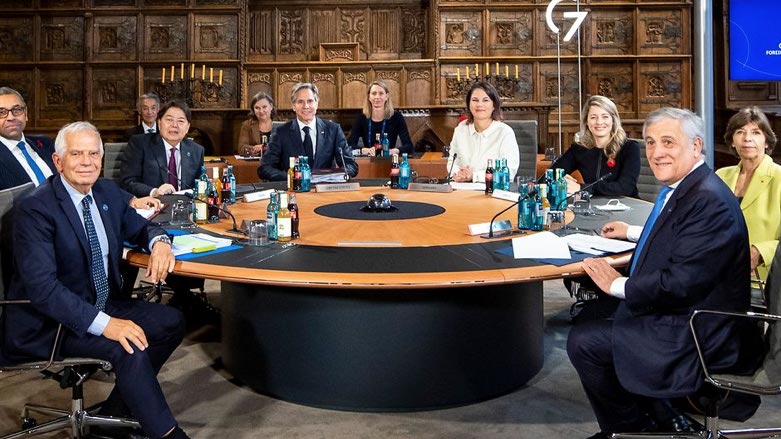G-7 Foreign Ministers slam Iran for repressing protests; failure to reach nuclear deal; support for Russia’s war in Ukraine
It has been decades since there was such unanimity on the malign nature of the regime and the challenges it poses.

WASHINGTON DC, United States (Kurdistan24) - The G-7 Foreign Ministers concluded a two day conference on Friday in Münster Germany, in which Iran featured prominently.
Read More: G-7 to discuss Iran at Foreign Ministers meeting later this week
The statement issued after the conclusion of the meeting represented an unprecedented criticism of Tehran by the group.
The G-7 slammed the Iranian regime for its repression of the country-wide protests, now in their seventh week; its unwillingness to conclude a new nuclear deal; and its “destabilizing activities” in the Middle East, along with arms sales to Russia for use in its war against Ukraine.
The strong criticism of Tehran—coming from Europe, the US, and Japan—is without recent precedent. It has been decades since there was such unanimity on the malign nature of the regime and the challenges it poses.
The current attitude of the major powers toward Iran is quite different than it was just a short time before. Less than three months ago, the European Union (EU) was still actively working to revive the 2015 nuclear deal formally known as the Joint Comprehensive Plan of Action (JCPOA.)
That meant an unwillingness to challenge Iran on other aspects of its malign behavior, lest that create problems in the nuclear talks, which was the top priority of the US and EU.
That was so, even as US allies, like Israel and the Arab Gulf states, were strongly critical of the diplomacy, as they did not believe reviving the JCPOA would prevent Iran from obtaining a nuclear weapon, while it would provide Tehran with huge sums of money to finance its malign activities.
Read More: EU-sponsored Iran nuclear talks end, again, with no agreement
Criticism of Regime’s Repression of Protests—Amini’s Kurdish Name Cited
Notably, the statement of the G-7 Foreign Ministers criticizing the regime’s repression of the protests triggered by the Sept. 16 death of a young Kurdish woman, detained for not properly wearing her hijab, used her Kurdish name: Jina.
“We condemn the violent death of the young Iranian woman, ‘Jina’ Mahsa Amini, after her arrest by Iran’s so-called ‘morality police,’” the statement said.
“We further condemn the brutal and disproportionate use of force against peaceful protesters and children,” it continued, and “urge Iranian authorities to honor their international obligations under international law, including the International Covenant on Civil and Political Rights.”
“We also call on the Iranian authorities to release unjustly detained prisoners, including recently arrested protestors, children, journalists and human rights defenders and ensure accountability for perpetrators of human rights violations and abuses,” it added.
Nuclear Issue: Iran Responsible for Failure to Renew JCPOA
The Foreign Ministers also criticized Tehran’s position in the JCPOA negotiations. For the first time, the G-7, which includes the EU, endorsed the US position that it is Iran that is responsible for the failure to renew the accord, which Donald Trump left in 2018.
Iran has not made the political decisions that are required to renew the JCPOA, they said.
“We note that despite many months of intense negotiations on a return to the JCPOA, Iran has not made the necessary decisions,” the G-7 statement explained.
In addition, the ministers cited ongoing developments in Iran’s nuclear capabilities. “We remain deeply concerned by the unabated expansion of Iran’s nuclear program,” they stated, “which has no credible civilian justification.”
Iran’s Destabilization of the Middle East; Arms Transfers to Russia
The ministers also strongly criticized “Iran’s continued destabilizing activities in and around the Middle East,” which “include Iran’s activities with both ballistic and cruise missiles, as well as unmanned aerial vehicles (UAVs)” and “the transfers of such advanced weaponry to state and non-state actors.”
“Such proliferation is destabilizing for the region,” they continued, “and escalates already high tensions.”
They called on Iran “to cease its support to violent state and non-state actors and proxy groups and fully abide by all relevant United Nations Security Council Resolutions [UNSCRs.]”
Iranian arms transfers to Russia, in specific, were criticized. “We will continue to impose economic costs on Russia and on other countries, individuals or entities providing military support for Moscow’s war of aggression, as several of us have already done regarding Iran’s provision of Unmanned Aerial Vehicles (UAVs) to Russia,” the ministers said, as they characterized Iranian arms transfers to Russia as “blatant violations of UNSCR 2231”—which prohibits Iran from exporting certain weapons until 2023.
However, on this point, the communique lacked the sharpness one might have expected. Perhaps, there is a lack of consensus, as Iran denies it is selling Russia weapons that are crucial to its war effort.
US Secretary of State Antony Blinken, speaking at the end of the meeting, denounced Iran in much stronger terms.
“We’re also working together to impose sanctions on those supporting President Putin’s war” in Ukraine, Blinken said. “That includes Iran, whose combat drones are killing Ukrainian civilians and destroying civilian infrastructure, and whose personnel in Crimea are assisting Russia in carrying out these brutal attacks.”
Next Steps?
Behnam ben Taleblu, a senior fellow at the Foundation for Defense of Democracies, welcomed the tougher line on Iran that the G-7 adopted in Germany, but also suggested that more needs to be done. Above all, words need to be translated into actions.
“The shared understanding of the multilayered threat by the Islamic Republic offers the West an opportunity to bridge the trans-Atlantic gap which has long existed on Iran policy,” ben Taleblu told Kurdistan 24.
“It’s high time,” he continued, “this common consensus be used to share everything from sanction targets to export control best practices to developing channels of support to better stand with the Iranian people.”
